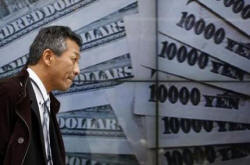|
 Safe-haven
yen gains in cautious mood ahead of Fed Safe-haven
yen gains in cautious mood ahead of Fed
 Send a link to a friend
Send a link to a friend
[October 27, 2015] By
Jemima Kelly
LONDON (Reuters) - The safe-haven yen
gained on Tuesday, hitting a seven-week high against the euro, as
investors turned risk-averse before the start of a two-day meeting of
the U.S. Federal Reserve.
|
|
 Markets are pricing in only around a 7 percent chance of a U.S. rate
hike this week, but they will be watching Fed Chair Janet Yellen
closely for any clues to whether "lift-off" could come at its next
meeting in December. Markets are pricing in only around a 7 percent chance of a U.S. rate
hike this week, but they will be watching Fed Chair Janet Yellen
closely for any clues to whether "lift-off" could come at its next
meeting in December.
The yen had fallen last week, hitting a two-month low against the
dollar after the European Central Bank said it was ready to loosen
policy further and China cut interest rates again, fuelling
speculation that the Bank of Japan could signal more easing at its
meeting on Friday.
But the currency strengthened on Monday after a key Japanese
government adviser said the BoJ could wait for more easing because
the job market remained tight. It was further supported on Tuesday
by a risk-off move that saw equities and other riskier assets such
as commodities moving lower.

The euro fell 0.6 percent to 133.03 yen , its weakest since early
September. The dollar also fell 0.6 percent to 120.43 yen, having
hit 121.60 on Friday.
HSBC currency strategist Dominic Bunning in London said markets were
in a "holding pattern" ahead of the Fed and BoJ, and that the
current risk-off sentiment would not last.
"Classic risk assets are all slightly softer but it's not been an
aggressive move," he said. "I don't think the positioning is there
to see these massive spikes in emerging market selling and related
safe-haven strength because I think a lot of the positioning has
been cleared out in those markets."
The main focus for currency traders in the European session was UK
growth data due at 0930 GMT which, if robust, could see expectations
for the first Bank of England rate hike since the financial crisis
brought forward, boosting sterling.
[to top of second column] |

Against the dollar, the euro edged down 0.1 percent to $1.1050,
having fallen over 2 percent since ECB chief Mario Draghi's news
conference last Thursday. It was given little support by a
slightly-better-than-expected German business confidence survey on
Monday.
"Draghi blamed the euro appreciation of the last few months for the
disappointing trend in inflation," wrote Commerzbank strategists in
a research note.
"That means that the euro is unlikely to appreciate despite
favorable economic news -- the ECB will make sure that it doesn't."
(Additional reporting by Lisa Twaronite in Tokyo; Editing by
Catherine Evans)
[© 2015 Thomson Reuters. All rights
reserved.] Copyright 2015 Reuters. All rights reserved. This material may not be published,
broadcast, rewritten or redistributed.

 |